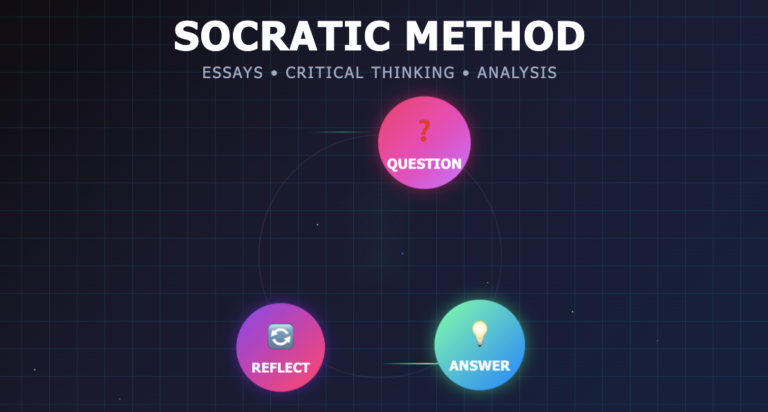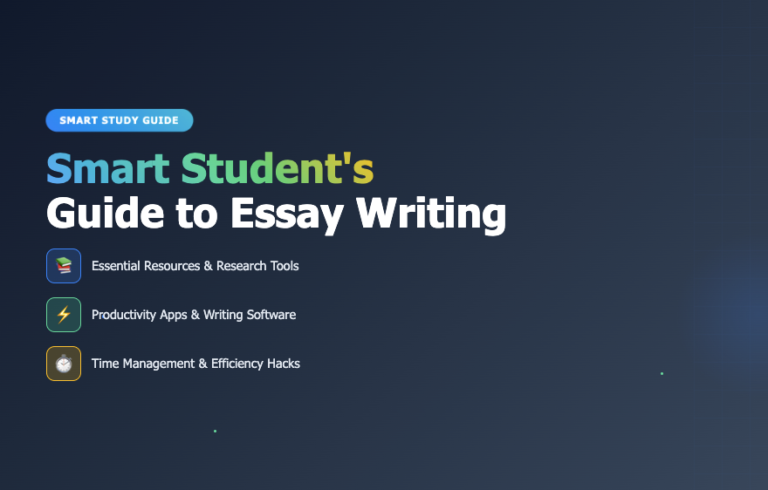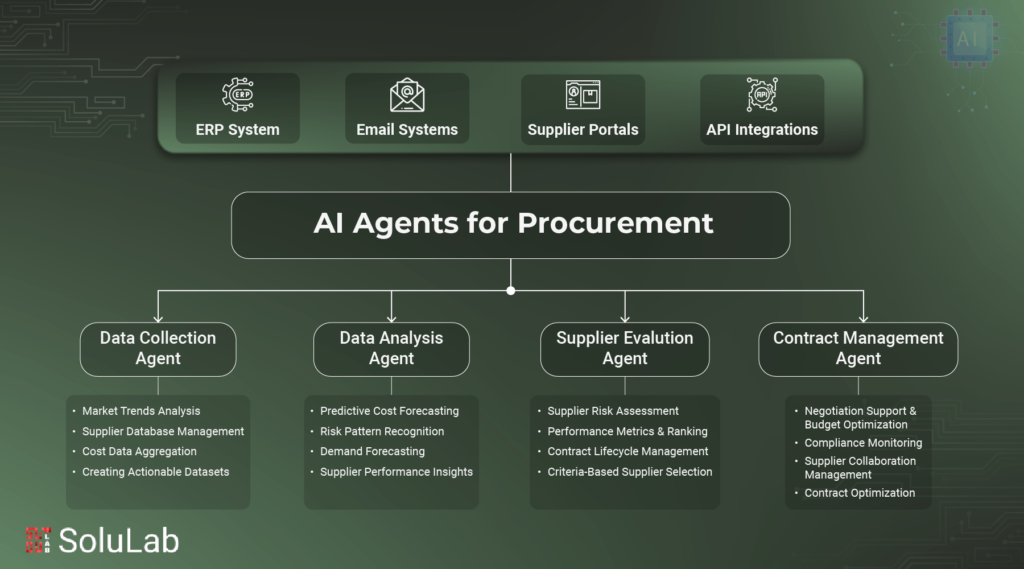
AI improves procurement through the automation of manual processes, the simplification of workflows, and the facilitation of real-time decision-making for better supplier management.
The significance that supplier acquisition and control play in today’s manufacturing industry environment significantly reduces market competitiveness.
A 2023 global survey found that procurement decision-makers utilized AI largely for spend analytics (67%) and contract lifecycle management (62%). E-procurement opportunities increased for 27% of AI users.
Organizations rely on AI to influence these crucial procurement factors since they prioritize innovation and low cost. AI can completely transform procurement through breakthroughs that improve supplier relations, automate repetitive tasks, and improve decision-making.
The following blog post will cover the nature and types of AI agents’ effects on changing manufacturers’ and suppliers’ purchasing habits.
What is Procurement and Supplier Management?
The process of purchasing goods and services from outside vendors is known as procurement. It includes determining requirements, picking suppliers, settling on agreements, and overseeing purchases. Businesses can cut expenses and increase productivity by using effective procurement, which guarantees the correct products at the best price, quality, and timing.
Examples of supply chain abstraction and procurement include:
- supplying tangible commodities, such as raw materials, and items you use to run your company, such as office chairs or printer ink.
- purchasing services such as cleaning, consultancy, or done-for-you labor.
Benefits of AI Agents in Procurement
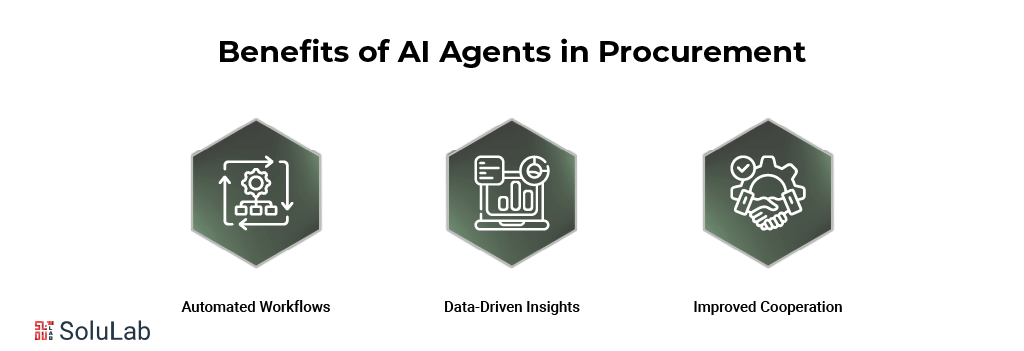
Agentic AI helps organizations forecast demand, evaluate suppliers objectively, and mitigate supply chain risks.
- Automated Workflows: Procurement teams can concentrate on higher-value duties by using automated workflows to reduce time spent on manual chores.
- Data-Driven Insights: In areas like risk assessment, spend management, and supplier selection, real-time data help guide choices.
- Improved Cooperation: At every S2P step, a smooth relationship is ensured by improved contact with suppliers thanks to agent AI procurement solutions.
Use Cases of Procurement and Supplier Management
Applications of AI in procurement are becoming more complex and varied. Some noteworthy AI agent use cases are as follows:
1. Supplier Risk Assessment: AI techniques are also used in processes to take into account the suppliers’ performance and future stability. To prevent credit risk models with machine learning supply chain issues, for instance, these informational application areas can be used to assess the risk to a company’s financial stability and delivery reliability.
2. Cost Prediction: With the aid of predictive analytics, it is also feasible to forecast costs in cost control and obtain precise outcomes. AI can suggest the most effective methods for pricing and utilizing the allocated budget based on past data and the general market trend.
3. Automated Procurement Procedures: AI agents in procurement allow procurement professionals to focus more on strategic procurement tasks by automating tasks like order processing and invoice matching.
4. Performance Monitoring: By using AI to continuously monitor suppliers’ KPIs, the company can hold suppliers accountable and maintain the highest standards for products and services.
5. Demand Forecasting: By using these algorithms, producers may predict future demand and use that information to decide which goods to refill and when to do so to save inventory holding costs.
Traditional Procurement vs. Agentic AI Procurement and Supplier Management
It is crucial to contrast conventional procedures with AI-based approaches to comprehend how AI is affecting procurement.
| Aspect | Traditional Procurement | AI-Based Procurement |
| Data Analysis | Relies on manual data processing | Utilizes automated data analytics |
| Decision-Making | Subjective and inconsistent | Data-driven and objective |
| Supplier Selection | Based on relationships and reputation | Guided by performance metrics and predictive analytics |
| Efficiency | Time-intensive and error-prone | workflows with faster turnarounds |
| Risk Management | Focuses on reactive measures | Enables proactive risk assessment with real-time monitoring |
Impact on Customers Due to Traditional Methods
Conventional procurement techniques frequently result in many problems that impact both manufacturers and their clients:
1. Delayed Response Times
Customers may have to wait longer for products due to manual procedures and arbitrary judgments.
2. Poor Product Quality
Depending too much on historical connections rather than data-driven insights can lead to poor product quality, which lowers customer satisfaction.
3. Increased Costs
In the absence of predictive analytics, producers might pass up chances to cut costs, which would raise consumer prices.
4. Limited Supplier Collaboration
Proactive communication may be impeded by traditional methods, leading to production and inventory misalignments that impact on-time delivery.
5. Supply Chain Disruption Risk
Reactive risk management raises the possibility of supply chain startup problems, which could cause customer delays or stockouts.
AI-powered procurement improves customer happiness by increasing efficiency, strengthening supplier relationships, and improving quality control.
Technologies Transforming Procurement with AI Agents
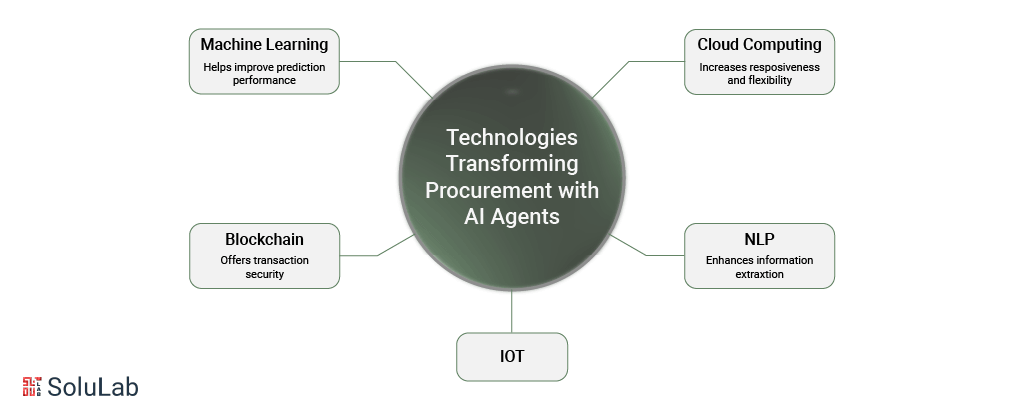
When using AI agents to transform procurement processes, many technologies are essential:
- Machine Learning: Helps firms make better judgments by improving prediction performance regarding future demand and supplier dependability.
- Natural Language Processing (NLP): Improve the ability to extract information from provided NLP application documents and make it simpler to respond to supplier requests.
- Blockchain: Offers transaction security, which is essential for establishing and preserving solid blockchain platforms supplier relationships.
- Cloud computing: Improves flexibility and responsiveness by enabling remote access to procurement data and real-time collaboration.
- The Internet of Things (IoT): Integrating sensors and devices to provide real-time data on inventory levels and supply chain situations enhances visibility and decision-making.
Augmented reality (AR) can be used to view products and assess their quality throughout the procurement process, especially in complex supply networks.
How Will AI Agents Be Deployed in Procurement?
Autonomous AI agents will play a key role in supply chain and procurement management, particularly when it comes to handling the complexity and scale issues of today. Here’s how:
1. Procurement Orchestration
These representatives expedite procedures such as response evaluation, purchase order creation, and supplier communication. For example, GEP’s multi-agent framework reduces human labor and improves accuracy by using specialized agents to manage RFx management, supplier scorecards, and contract awards.
2. Managing Complexity
Geopolitical concerns, shifting market conditions, and logistical bottlenecks are just a few of the difficulties that global supply networks face. By automatically rerouting shipments, modifying sourcing tactics, and guaranteeing compliance in real-time, AI agents are excellent at handling this complexity.
3. Making Decisions in Real Time
These agents transform procurement from a reactive to a proactive process. They keep a close eye on supplier performance, market developments, and geopolitical threats. They modify procurement methods on their own when anomalies occur, such as a spike in commodity prices, and can secure better bargains more quickly than human teams.
4. Supplier Collaboration
It frequently requires a large investment of resources to maintain positive supplier relationships. Teams may concentrate on strategic partnerships as AI agents automate repetitive tasks, track supplier performance, and even offer comments.
5. Risk Mitigation
These agents anticipate possible interruptions, such as weather occurrences or geopolitical conflicts, by using predictive analytics. For instance, if a major vendor is not functioning up to par, they can recommend other suppliers or reroute supplies in advance of a storm.
How AI Agents Supersede Other Technologies?
With several developments anticipated to influence the market, AI in procurement appears to have a bright future.
- AI Tool Integration: As more businesses implement AI software in procurement operations, it is anticipated that the usage of automation in procurement processes will grow in the future.
- Advanced Predictive Analytics: It also describes how more businesses will rely on AI to foresee requirements more accurately and to mitigate risks. AI will enhance real-time communication with suppliers, leading to better and more equal relationships. This will boost supplier collaboration.
- Sustainability Focus: Artificial Intelligence (AI) will assist businesses in identifying sustainable suppliers and processes, indicating that sustainability is now a key consideration in buying decisions.
- Continuous Learning: Machine learning will advance, meaning that procurement will get increasingly automated and smarter every year.
Procurement Operations and Tactical Purchasing
AI-powered automated reordering minimizes stockouts and surplus inventory by determining the best times to place new orders.
1. Tactical Purchasing with GenAI Agents
Tactical Purchasing AI agents allow tactical purchasing teams to automate repetitive purchases, improving timing and reducing costs.
- Smart Spending: AI systems make sure that strategic objectives are met by tactical purchases.
- Investigate Further: Learn about the use of AI in tactical purchasing.
2. Using Autonomous Agents to Reduce Procurement Cycle Times
AI agents drastically cut down on procurement cycle times by streamlining compliance inspections and approval workflows.
- Efficient Approvals: Automated inspections and approvals can expedite the procurement process.
- Faster Order Fulfillment: Products and services are delivered more quickly when cycle times are shorter.
Example: Using AI in Procurement Processes
To oversee the entire purchase process, the procurement expert now employs an AI agent. The AI agent administers contracts, keeps an eye on supplier performance, and negotiates the best terms with suppliers in addition to researching vendors and comparing quotes.
To maintain continuity, the AI agent actively looks for alternate suppliers and makes backup plans when it notices any supply chain interruptions, such as a critical supplier’s delivery delay.
The AI agent also provides real-time insights and recommendations based on predictive analytics to help the procurement professional make informed strategic decisions.
This approach transforms procurement into a highly efficient, data-driven, and agile process, significantly boosting the organization’s resilience and competitiveness.
The Future of Procurement with AI Agents
The next development in procurement technology is represented by AI agents. AI agents are sophisticated systems with the ability to make decisions on their own and manage tasks proactively, in contrast to simple AI tools that automate particular tasks. They can learn from data, communicate with other systems, and keep getting better at what they do.
With little assistance from humans, procurement agents may handle all aspects of a process, from contract administration and supplier selection to order processing and performance evaluation.
The capacity of AI agents to act independently and complete tasks without continual human supervision is one of their most prominent advantages. This implies that supply chain interruptions and other problems can be proactively detected and resolved by AI agents before they become serious ones.
Furthermore, AI agents learn from the data they process constantly, which enables them to adjust to shifting circumstances and gradually enhance their performance. Additionally, they can work together with other AI tools and systems to improve the procurement process’s overall efficacy and efficiency.
Conclusion
Procurement will transition from labor-intensive, manual procedures to highly automated systems driven by artificial intelligence (AI) agents. By facilitating independent and proactive control of procurement operations, they will further transform procurement.
Leaders who want to understand the most recent advancements in AI in procurement should see AI agents as a strategic necessity rather than just a technical improvement. In the face of supply chain difficulties and market shifts, AI agents will put their companies in a more robust, competitive, and adaptive position.
SoluLab helped Sight Machine, a leader in digital manufacturing, get around a lack of resources while making a tech product. SoluLab improved Sight Machine’s digital solutions by using its knowledge of generative AI and machine learning to build scalable architecture and combine advanced AI models. This allowed the company to provide new, data-driven manufacturing solutions. SoluLab an AI Agent development company has a team of experts to solve your business problems and grow your business. Contact us today to discuss further.
FAQs
1. What is an AI agent for procurement?
Software that leverages artificial intelligence to automate and improve procurement procedures, including cost analysis, contract administration, and supplier selection, is known as an AI agent for procurement.
2. How does an AI agent improve procurement efficiency?
AI agents workflows by analyzing data annotation, identifying trends, automating repetitive tasks, and providing actionable insights to help procurement teams make informed decisions quickly.
3. What tasks can AI agents automate in procurement?
AI agents can handle supplier discovery, purchase order processing, invoice matching, inventory management, and spend analysis, among other tasks.
4. How does an AI agent choose the right supplier?
AI agents use data analysis and machine learning algorithms to evaluate suppliers based on performance, cost, delivery times, and quality, ensuring the best fit for your needs.
5. Can an AI agent help reduce procurement costs?
Indeed, by examining expenditure trends, negotiating better prices, and getting rid of procurement process inefficiencies, AI agents can find ways to save money.





